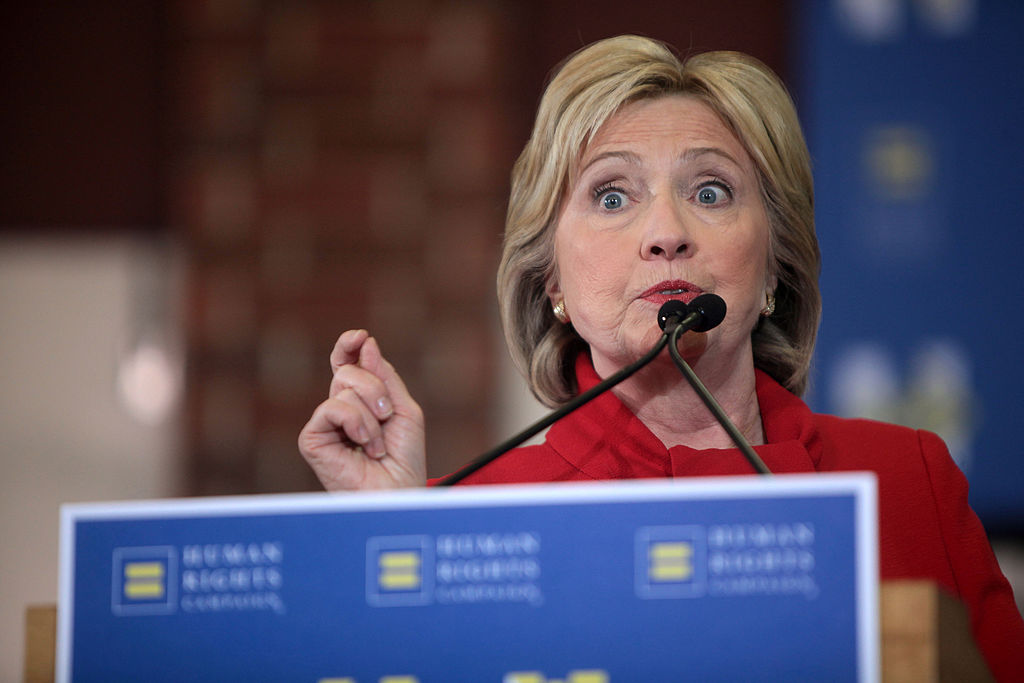Originally published at MintPress News.
MANCHESTER, New Hampshire — During the build up to every presidential election, the eyes of the world turn to two states: Iowa and New Hampshire. Home to the Iowa Caucus, and the first primary elections, respectively, they’ve become key campaign stops for every presidential candidate. This time, a group of Quaker-trained “bird dogs” is making these carefully managed publicity tours more challenging.
Created by the American Friends Service Committee, “Governing Under the Influence” is a campaign to challenge presidential candidates to own up to the power of corporate influence in modern American politics. The AFSC is a nonprofit organization created by the Quakers, and in keeping with that religion’s strong anti-war beliefs, the Governing Under the Influence campaign specifically targets military spending, the militarization of the U.S. border with Mexico, and the country’s out-of-control prison population.
In both states, the campaign is tracking the candidates’ every public appearance and sending teams of trained volunteers, called “bird dogs” in reference to their stubbornness and persistence, to ask difficult questions about campaign financing and the future of democracy. The campaign is deliberately nonpartisan, ensuring that all candidates are challenged on their stance on these key issues.
“We’re really trying to move the whole process,” said Arnie Alpert, co-director of AFSC’s New Hampshire program, in an interview with MintPress News last week. “We’re not about trying to back particular campaigns or say that this candidate needs to be defeated. We’re about fixing the political discourse in this country.”
Alpert has worked with AFSC to promote peace and justice, often by targeting presidential campaigns, since 1981.
Alpert sees the Iowa and New Hampshire campaign seasons as a crucial time during the election cycle for activists to directly reach the future president. “The system right now is pretty tightly sealed, but this little crack opens up in New Hampshire and Iowa every four years,” he told MintPress. “Just in the last week we’ve had staff and volunteer interactions with Hillary Clinton, Bernie Sanders, Jim Webb, and Carly Fiorina. Our banners were outside Jeb Bush’s town meeting in Derry, New Hampshire, and we’ll be outside Donald Trump’s event in Manchester, New Hampshire.”
MintPress also spoke with Kevin Rutledge, an Iowa native and Grassroots Education Coordinator with AFSC’s Presidential Campaign Project in the state. He explained that the presidential campaign season is an important time not only to reach the next president, but also to influence media coverage.
“There’s reporters from all over the country and all over the world here and they’re just tracking the candidates,” Rutledge said. “They’re outside of these events and they’re all reporting on the same thing, so we provide them with something to report on. We’ve got these big banners, and educational information about Pentagon contractors and for-profit prisons. They turn to us because not everyone can get inside and so we end up in four different news stories.”
Alpert also mentioned that both activists and journalists use the candidate appearance calendar on the Governing Under The Influence website to research candidates’ upcoming engagements.
Yet not everyone welcomes the bird dogs in their midst. Security guards asked Rutledge to leave the Iowa Agriculture Summit in March, which featured appearances by nine presidential hopefuls.
“They thought I was going to interrupt, but we just ask questions in a conversational way. That’s the Quaker way — we don’t attack people,” Rutledge told MintPress. Although the summit was a public event, Rutledge blames the corporate sponsors for removing dissenting voices. According to the Des Moines Register, he was one of at least three young activists asked to leave the summit.
In general, however, the organizers told MintPress that candidates and members of all parties welcome the respectful, nonpartisan approach of the group. While Alpert explained that the campaign isn’t likely to single-handedly fix the problems of corporate power in American politics, he believes it’s already influenced the national dialogue in important ways.
As an example, he explained that one issue the campaign’s “bird dogs” are trained to raise is the mandatory immigrant detention quota, which requires that U.S. Immigration and Customs Enforcement keep at least 34,000 immigrants locked up at all times, even if some might otherwise be eligible to remain free while awaiting deportation trials. This quota ensures that for-profit prisons’ immigrant detention centers are always kept flush with profitable inmates.
“We had a group a group of Quaker high school students ask Hillary Clinton about it back in October,” Alpert said. “Hillary said, ‘Gosh, I’ve never heard about that before.’” Clinton asked the students to share an index card on which they’d written down their question and promised to investigate the issue.
“Months later, in her speech about immigration that she gave in Nevada she was talking about the problem of for-profit prisons incarcerating immigrants,” he said.
Jennifer Epstein, writing for Bloomberg Politics early last month, said the speech took “an aggressive position on immigration” that left “little room for any potential Democratic challengers to tack to her left.”
“This is really cool,” Alpert told MintPress. “Maybe we can’t take full credit for that, maybe she would have reached that conclusion anyway, but there’s a connection.”
